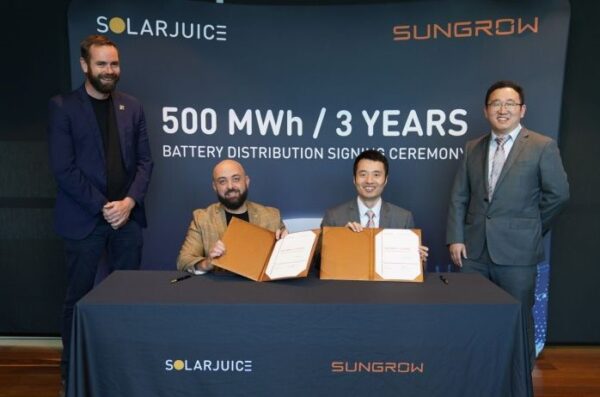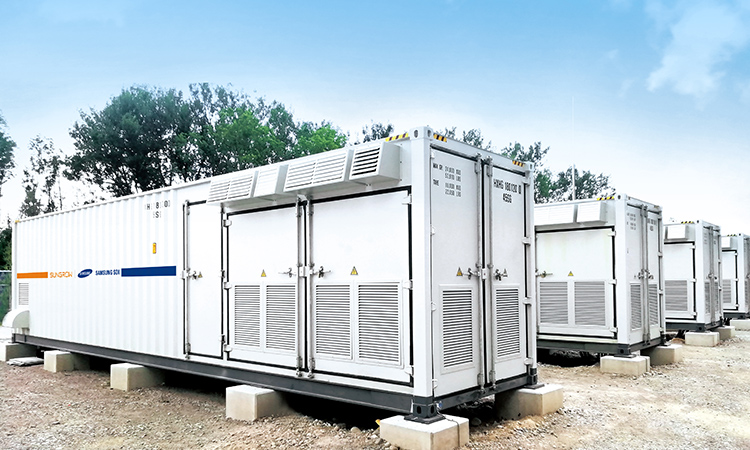Sungrow has expanded its relationship with Sydney-based wholesaler Solar Juice with the partners signing a new distribution agreement that will provide 500 MWh of the Chinese company’s energy storage systems (ESS) for the Australian market. Sungrow has also signed a new contract with Brisbane-headquartered wholesaler Raystech Group to supply another 250 MW of its inverters and 50 MWh of its ESS solutions.
Sungrow Australian Country Manager Joe Zhou said the supply contract with Solar Juice is a major milestone for the company, revealing it is the biggest battery distribution contract yet signed by the Chinese company.
“The partnership with Solar Juice is a significant step as it’s the largest battery project signed with our distributors,” he said.

Image: Sungrow
The agreement builds on a three-year deal signed by the two parties last year for a 2 GW supply contract. Sungrow said that annual target has been beaten already and the new deal will continue to help accelerate the adoption of solar energy in Australia and create new opportunities for growth in the renewable energy sector.
Zhou said Australia’s ongoing transition to a low-carbon economy means the need for innovative and reliable renewable energy solutions, in particular energy storage has never been greater.
“Energy storage systems are essential technologies because of the support they provide in times of need to overcome supply-demand balance challenges,” he said.
Sungrow has also signed a new distribution contract with Raystech which includes the supply of 250 MW of its inverter range and 50 MWh of its ESS solutions. The agreement builds on an initial 150 MW sales contract signed last year.
Zhou said the partnership with Raystech, which has a distribution network across both Australia and New Zealand, will allow Sungrow to increase its penetration into more segments in both markets.
In other developments, Sungrow recently announced has achieved product certification in line with South Australia’s soon-to-be-introduced flexible solar exports requirements.
From 1 July 2023, the South Australian government will require new rooftop systems be fitted with software that allows electricity distributor SA Power Networks to dynamically control solar exports.
The new Dynamic Export Limit (Flexible Exports) will require all new installations up 30 kW to have CSIP (IEEE 2030.5) communication built in to allow the network operator to adjust systems’ export limit remotely.
The government has said the program is aimed at encouraging the uptake of rooftop solar, while also ensuring that the grid can handle the influx of energy during periods of high solar generation.
SunGrow said while some of its products have already completed the necessary compliance with the state’s Flexible Export Program, all of its inverters will complete the necessary development and listing process before the 1 July 2023 deadline.
Sungrow said in the future, all of its inverters will natively support dynamic export function, without requiring additional controllers, aggregators or subscription fees.
This content is protected by copyright and may not be reused. If you want to cooperate with us and would like to reuse some of our content, please contact: editors@pv-magazine.com.









By submitting this form you agree to pv magazine using your data for the purposes of publishing your comment.
Your personal data will only be disclosed or otherwise transmitted to third parties for the purposes of spam filtering or if this is necessary for technical maintenance of the website. Any other transfer to third parties will not take place unless this is justified on the basis of applicable data protection regulations or if pv magazine is legally obliged to do so.
You may revoke this consent at any time with effect for the future, in which case your personal data will be deleted immediately. Otherwise, your data will be deleted if pv magazine has processed your request or the purpose of data storage is fulfilled.
Further information on data privacy can be found in our Data Protection Policy.